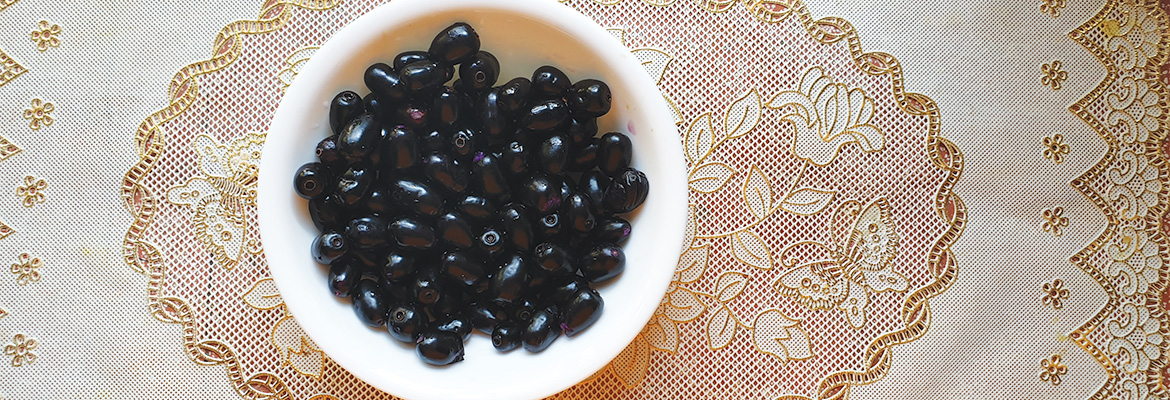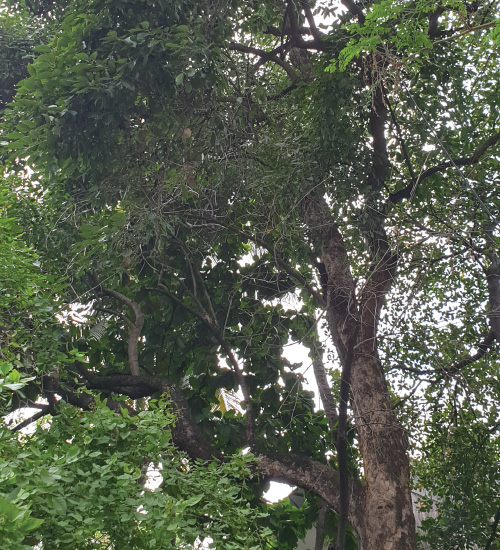The Jamun season is here 🙂

As I was growing up with diabetes, my mother introduced me to eat this fruit and its seed powder in the season saying it was good for me as it helped lower blood sugar levels. I started liking this fruit because of its astringent, sweet and sour taste and also more because it left a purple colour on the tongue. My house has a few Jamun trees so I have seen this small oval-shaped fruit from being green to pink and then crimson (resembling black) on ripping. I have also seen how Jamun was removed and how it stained the floor and my clothes.
My grandmother insisted that we must eat this fruit as it has a cooling effect on our body and so it comes when the mango season is ending as it helps to cool down the body from the heat created by having lots of mangoes. Being in the field of nutrition I wanted to share with you all the importance and benefits of this fruit which is in season now.
Jamun (Jambul, Jambolan, Jambil, Indian blackberry, and Java plum fruit) is a fruit of an evergreen tropical tree that is grown throughout Southeast Asia. Jamun tree first originated in India and the fruit is found in abundance in India. Its botanical name is Syzigium cumini. Jamun is highly appreciated and used in ayurvedic healing. All parts of the tree- its bark, leaf, fruit, and seed are used for different purposes and offer a variety of medicinal purposes.
This small fruit also contains a rather huge amount of nutritional value. It is rich in nutrients like Protein, Carbohydrates, Calcium, Iron, Vitamin C, Vitamin B, Minerals, Antioxidants, Magnesium, Potassium, Glucose, Fructose, and Fibre, which collectively work towards our overall health and wellbeing. 70% of the jamun fruit is edible. Glucose and fructose are the major sugars found in the ripe fruit. Sucrose is completely absent from the fruit. It provides fewer calories, as compared to other fruits.
Medical benefits of this fruit
- This fruit is light to digest and decreases the moist content of tissues.
- It has cold potency and acts as a body coolant.
- It increases Vata.
- It balances Pitta and Kapha.
Other benefits and uses
- Regulates blood sugar levels – Its anti-diabetic properties help keeping blood sugar level under control by converting starch and sugar into the energy. (jamun seed powder is effective for this)
- Improves immunity – As it’s rich in vitamin C it makes body’s immune system strong to fight with common seasonal changes.
- Good for eyes and skin health – Jamun contains good number of vitamins like A and C as well as minerals which are very beneficial for the health of eye and skin. (Jamun leaves are effective for this).
- Keeps Teeth and Gums Healthy – The antibacterial property of its leaves helps in strengthening as well as preventing teeth and gums from various infections.
- Prevents from infection – Being a good source of oxalic acid, gallic acid, malic acid, tannins, betulic acid and etc makes it capable as an anti-malarial, anti-infective and antibacterial.
- Natural bold thinner – Being a rich source of iron makes it a good blood purifier as it ensures oxygenated blood supply through the body.
- Improves and cures digestive disorders – As jamun is a coolant it is very beneficial for curing digestive disorders.
- An absorbent and is useful in malabsorption syndrome and diarrhoea.
- Provides relief from tiredness, throat pain.
- Useful in Emaciation (state of being extremely thin) asthma, cold, cough, dysentery
- Prevents from heart disorder – Jamun contains good amount of potassium which is very beneficial for keeping heart healthy and preventing for diseases like hypertension, stroke and other cardio vascular diseases.
Precautions
- Jamun seeds, barks and leaves have a property to lower the blood sugar level thus should be taken care by the diabetic patients as it may reduce blood sugar level to a great level.
- It should be avoided some days before and after any surgery as it might lower the blood sugar level.
Jamun can be enjoyed in a number of ways such as fruit. fruit salad, jamun ka sirka, jamun seeds powder, leaves, leaves powder, jamun juice, jam, murabba, jellies, pickles, chutney etc. It can be sprinkled with black pepper powder, black salt etc as per your taste and requirement,
Nutritive Value per 100 gm of Jamun Fruit
Energy: 62 kcal, Carbohydrates: 14 gm, Protein: 0.7 gm, Fat: 0.3 gm, Minerals: 0.4 gm, Fiber: 0.9 gm, Calcium: 15 mg
Season of jamun is from May to July, so enjoy it, and eat in moderation even if it’s your favourite fruit as over indulging may harm you.

